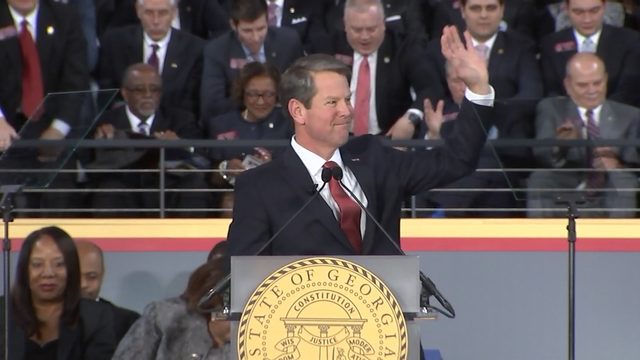Georgia Governor Brian Kemp (R) has been bolstering his “tough on crime” agenda by promising that the state will prosecute more people for gang-affiliated activities. In 2022, he approved the creation of a Gang Prosecution Unit under state Attorney General Chris Carr, who was also behind the Anti-Gang Network created in 2018. In April, Kemp signed Senate Bill 44, which institutes a mandatory minimum prison sentence of five years to sentences for convictions that violate the Street Gang Terrorism and Prevention Act, and 10 years if the conviction involves the recruitment of minors.
On June 5, in response to an indictment of 16 alleged gang members, the governor made a telling remark:
Great work by @Georgia_AG Chris Carr and public safety partners on all levels who helped investigate and make these arrests.
⁰When it comes to street gangs, we won’t back down in Georgia until their members are behind bars and they’ve been removed from our communities. https://t.co/4RGJw9FPsI— Governor Brian P. Kemp (@GovKemp) June 5, 2023
Kemp’s words make his perspective clear: Once people are inside prison, “they’ve been removed from our communities” because his definition of community does not extend to prisons.
His words also suggest that despite his interest in targeting gang-related activity, he fundamentally does not understand how it works. Gangs are not simply rendered inactive by prison walls. Anyone who’s experienced incarceration knows this well, and everyone currently incarcerated in Georgia Department of Corrections (GDC) facilities feels it acutely.
Many of the approximately 47,000 people currently incarcerated in GDC facilities are disabled. Many are queer, trans, very old, very young, in poor health or deprived of basic needs like affordable food and a place to sleep inside. They are vulnerable to abuses of power. And right now, the power in some GDC prisons is held by gangs.
Kemp is contributing to the increase in gang power he claims to fight.
At the beginning of the pandemic, a mass exodus of GDC staff left some facilities with no more than a handful of corrections officers for the entire compound. On weekends, it could feel like there was no security at all. Though there’s a little more staff presence now than in those early days, the power vacuum left by unfilled staff posts has been filled by prisoners with the most organized resources.
Many prisoners and advocates have been desperately calling on Kemp and GDC leadership to send in the Georgia National Guard, to restore some modicum of security for prisoners trapped inside facilities overtaken by gang violence. Understaffing has also severely compromised access to emergency medical care. It’s been almost two years since the Department of Justice began investigating the unprecedented violence and fatalities, and yet according to prisoners GDC facilities have been the site of least four distinct gang wars in 2023 alone.
Kemp himself is contributing to the increase in gang power he claims to fight, by facilitating more gang-related convictions and packing everyone into GDC prisons for even longer sentences, while continuing to ignore the understaffing crisis or any of the suggested solutions.
He made a similar statement to his June 5 tweet around the time of his signing SB 44, claiming that his administration would “not let up until gangs in Georgia are completely gone because their members are behind bars and are unable to bring new members to replace them.”
He is either unaware that incarcerated gang members can and do recruit heavily from inside prison, or or is intentionally misleading the public.
SB 44 will take effect July 1. That the state of Georgia will be handing down longer sentences to people with gang-related convictions is a grim development for people incarcerated in GDC prisons.
GDC was the site of at least 30 homicide deaths and 40 suicide deaths in 2022.
GDC’s response to gang violence has been primarily to crack down on contraband cell phones, which prisoners have used to send footage of coordinated stabbings, dead bodies left unmoved for hours and prisoners setting themselves on fire. GDC was the site of 30 confirmed homicide deaths and 40 confirmed suicide deaths in 2022.
The Georgia legislature has allocated millions of dollars toward gang prosecutions, while the public defense system remains gravely underfunded. Without enough public defenders to keep pace with the increase in prosecutions, more Georgians who can’t afford a lawyer will be trapped in already packed jails for months—sometimes years—before they even have the chance to go to trial.
There’s also something that would be almost laughable, if the situation wasn’t so dire, about what Kemp is saying would happen if he did somehow manage to prosecute every instance of gang activity.
Apparently, if we can just get every single gang member of all the different gangs in the state of Georgia packed into the same prisons at same time, without any additional support for the handful of corrections officers who might show up to work on a given day, the violence will immediately cease.
Photograph of Gov. Brian Kemp via Georgia Department of Administrative Services/WSBTV





Show Comments